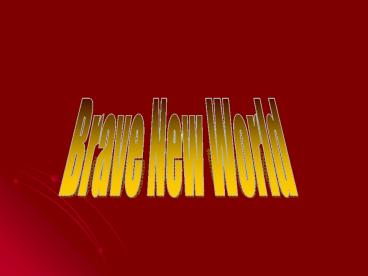Brave New World - PowerPoint PPT Presentation
1 / 9
Title:
Brave New World
Description:
Title: PowerPoint Presentation Last modified by: user Created Date: 1/1/1601 12:00:00 AM Document presentation format: On-screen Show Other titles – PowerPoint PPT presentation
Number of Views:198
Avg rating:3.0/5.0
Title: Brave New World
1
Brave New World
2
About the author..
- Aldous Huxley was born in England in 1894
grandson of the prominent biologist T.H. Huxley
and brother of Julian Huxley, also a biologist.
Huxley first studied at Eton College but later
went to Balliol College in Oxford.At 16, he
suffered months of blindness but one eye
recovered and with special glasses he completed
his studies. He majored in English when he was
unable to pursue his chosen career as a scientist.
3
Writing Brave New World
- He became friends with many writers and
surrounded himself with intellectuals such as D.H
Lawrence and Bertrand Russell. After having
traveled in Europe, in the 1930s he moved to
France where he wrote in four months Brave New
World, a dystopian vision of a highly
technological society of the future (the word
"utopia" comes from Thomas More's novel Utopia).
4
Huxleys novel
- In 1932 Brave New World was published. It is a
cry of warning and nightmarish black comedy of a
future society. The book received mixed reviews.
H.G. Wells was offended by what he regarded as
Huxley's betrayal of science and the future.
Other critics recognized the serious intent
beneath the surface of playful wit. In its first
year it sold a total of twenty-eight thousand
copies in England and in the United States, and
enjoyed respectable sales throughout the
remainder of the century.
5
Origin of the title
- Brave New World is Huxley's most famous and
enduring novel. The title comes from Miranda's
speech in Shakespeare's The Tempest, Act V, Scene
I - "O wonder!
- How many goodly creatures are there here!
- How beautious mankind is!
- O brave new world,
- That has such people in't!"
6
A banned book!
- Huxley's book has also become one of the most
frequently banned books in literary history. Book
banners have cited "negative activities"
(undoubtedly referring to the sex and drugs) in
the book as reason enough to prevent students
from reading the book. In 1993, an attempt was
made to remove this novel from a California
school's required reading list. It was also
removed from classrooms in Miller, Missouri in
1980, among other challenges.
7
Inside the front cover of Brave New World
translated from French-
- Utopias appear to be much easier torealize than
one formerly believed.We currently face a
question thatwould otherwise fill us
withanguish How to avoid their
becomingdefinitively real ? The utopias are
attainable. Life marches towards the utopias. And
it can be that a new century begins, a century
where the intellectuals and the educated class
will dream means to avoid the utopias and to
return a non-utopian society, less "perfect" and
free.Nicolas Berdiaeff
8
Brief Introduction to BNW
- The novel is set in A.F. 632, approximately seven
centuries after the twentieth century. A.F.
stands for the year of Ford, named for the great
industrialist Henry Ford who refined mass
production techniques for automobiles. The world
is ruled by World Controllers who ensure the
stability of society. To ensure social stability,
a five-tiered caste system ruled by Alphas and
Betas has been created. The labor force comes
from the lower three castes, known as Gammas,
Deltas, and Epsilons. A drug called soma ensures
that no one ever feels pain or remains unhappy,
and it is rationed out to and used by members of
every caste. Social stability is further ensured
through the use of pre- and postnatal
conditioning.
9
Intro continued
- In an 1961 interview, Huxley expressed his
concern that emerging technology, scientific
progress, and social conditioning had the
potential to destroy human individuality. It may
not have been Huxleys intention to be prophetic
but it is impossible to ignore the similarities
between Huxleys imaginary world and our real
one!































